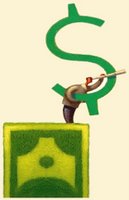Futures Market 94% Certain Prime Rate Will Hold At 3.25% After The April 29 Fed Meeting
 The Dow Jones Industrial Average (DJIA) advanced by 497.80 points this week (6.839%) while the broader S&P 500 Index gained 47.40 points (6.168%.) It was the third straight week of gains for the two indices since stocks hit a bear-market low on March 6, 2009. For some perspective, here's our latest bear market update.
The Dow Jones Industrial Average (DJIA) advanced by 497.80 points this week (6.839%) while the broader S&P 500 Index gained 47.40 points (6.168%.) It was the third straight week of gains for the two indices since stocks hit a bear-market low on March 6, 2009. For some perspective, here's our latest bear market update.Since closing with record highs on October 9, 2007, the DJIA has now given up 6,388.35 points (45.101%), while the S&P 500 Index has declined by 749.21 points (47.868%). The record high for the DJIA is 14,164.53; for the S&P 500 Index it's 1,565.15.
For the year, the DJIA is down 1,000.21 points (11.397%), while the S&P 500 is down 87.31 points (9.666%).
In other economic news:
- On Thursday, the Commerce Department released the final word on the gross domestic product (GDP) for Q4 2008: the U.S. economy shrank by an annualized rate of 6.3% during the last three months of last year.
- On Friday, the Commerce Department reported that personal income declined by 0.2% during February, while consumer spending advanced by 0.2%.
- On Monday, the National Association of Realtors® reported that prices on preowned homes improved, but inventories climbed higher. The median price on a used home rose from $164,800 for January to $165,400 for February, while the average price rose from $206,700 for January to $209,700 for February. Inventories -- the number of previously occupied homes for sale at the end of February -- jumped from 3,611,000 for January to 3,798,000 for February.
Click here for historical prices and a chart. - On Wednesday, the Commerce Department reported that the median price on a new (never-occupied) home fell from $206,800 during January to $200,900 during February.
Click here for historical prices and a chart.
As of right now, the investors who trade in fed funds futures at the Chicago Board of Trade have odds at 94% (as implied by current pricing on contracts) that the FOMC will vote to leave the benchmark target range for the Federal Funds Rate at its current level at the April 29TH, 2009 monetary policy meeting.
Summary of the Latest Prime Rate Forecast:
- Current odds that the Prime Rate will remain at the current 3.25% after the April 29TH, 2009 FOMC monetary policy meeting is adjourned: 94% (very likely)
- NB: U.S. Prime Rate = (The Federal Funds Target Rate + 3)
The odds related to federal-funds futures contracts -- widely accepted as the best predictor of where the FOMC will take the benchmark Fed Funds Target Rate -- are constantly changing, so stay tuned for the latest odds.
Labels: odds, prime_rate_forecast
|
--> www.FedPrimeRate.com Privacy Policy <--
> SITEMAP < |





